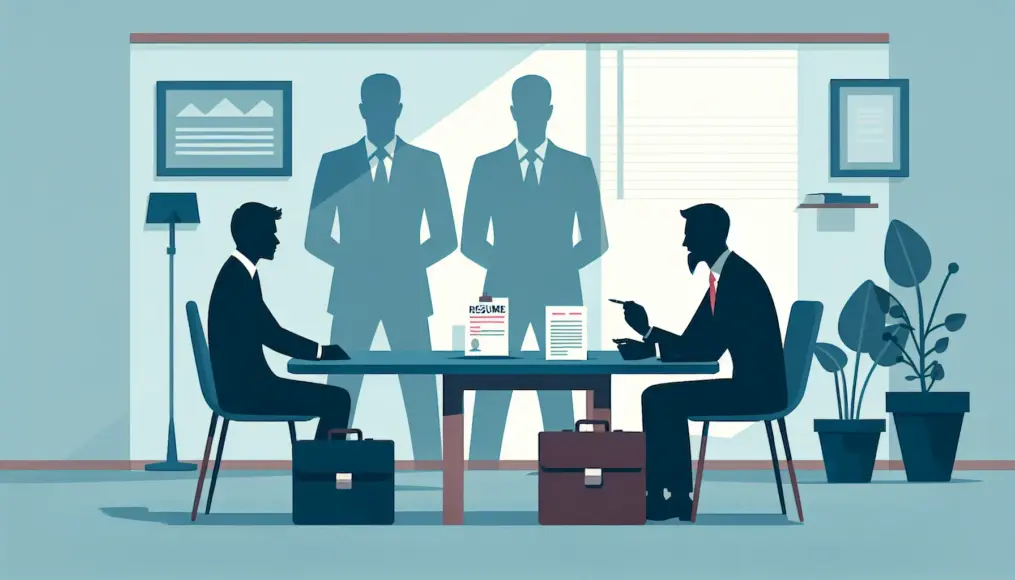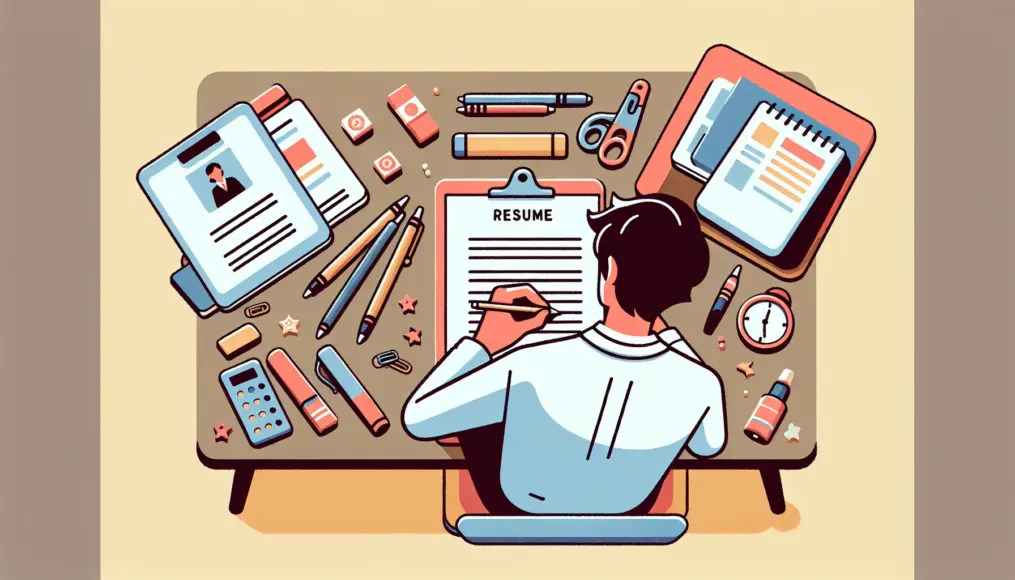Final interviews can be nerve-wracking, can’t they?
Knowing what questions might come your way ahead of time can help you mentally prepare for the big day.
In this article, we’ll dive into common questions you might encounter during a final interview and how to gear up for success.
- Understand the purpose of the final interview and what companies are looking for
- Familiarize yourself with common questions and their underlying intentions
- Learn how to stand out with thoughtful questions of your own
When it comes to final interviews, having a clear grasp of what’s expected can make a significant difference. Let’s break it down.
Understanding the Purpose of the Final Interview
The final interview is a crucial step in the job-hunting process.
It serves as the ultimate assessment for companies to determine whether a candidate is the right fit.
In this article, we’ll discuss what companies are looking for in the final interview and provide insight into the interviewers’ perspectives.
What Companies Look for in the Final Interview
During the final interview, there are several key aspects that companies focus on.
First and foremost is your understanding of the role and your adaptability.
Companies want to gauge how interested and knowledgeable you are about the position.
Next, compatibility with the team is also critical.
To assess whether you fit into the company culture and team dynamics, interviewers pay close attention to your personality and communication skills.
Thus, the final interview evaluates not just your skills but also your values and character.
- Understanding of the role and adaptability are essential
- Team compatibility is a key focus
- Personality and communication skills are also assessed
Gaining Insight into the Interviewer’s Perspective
Interviewers are not just listening to your answers; they are observing your thought process and reactions to understand who you are.
Therefore, it’s important to express not only your qualifications but also your genuine feelings and interests.
Interviewers will also be looking to see if you resonate with the company’s vision and mission.
So, how can you better understand the interviewer’s perspective and effectively promote yourself?
It’s crucial to grasp the intent behind the questions during the interview. For more tips, you might want to check out How to Succeed in Job Interviews: Question Strategies and Surprising Tips.
- Interviewers aim to understand your character
- It’s important to convey your genuine feelings, not just self-promotion
- Resonating with the company’s vision and mission is also evaluated
Common Questions and Their Intentions
During the final interview, you can expect to encounter several common questions.
These questions serve a purpose: they help the company understand and evaluate you.
Let’s take a closer look at two key areas: “self-introduction” and “career vision.”
Key Points for Self-Introduction
Self-introduction is a crucial step that typically takes place at the beginning of the interview.
Here, you’re expected to convey your background and skills concisely.
It’s not just about listing your job history; it’s important to weave in your personal story to leave a lasting impression on the interviewer.
For instance, discuss how certain experiences have contributed to your growth or how they’ve shaped your current work.
This way, your self-introduction becomes an opportunity to showcase your personality as well.
- Convey your background and skills concisely.
- Weave in your personal story to make an impression.
- Share how your experiences have been beneficial.
How to Communicate Your Career Vision
Questions about your career vision are also common in the final interview.
Companies want to know how you envision your growth in the future.
Having a clear vision is very important for employers.
Think about what skills you want to acquire and what roles you aspire to take on, and be ready to express those clearly.
Additionally, showing how your career vision aligns with the company’s vision can leave a positive impression.
To effectively communicate your career vision, it’s crucial to prepare in advance. For detailed preparation tips, check out the article on how to tackle common job interview questions! Your first step to success.
- It’s important to convey your future growth clearly.
- A clear vision is a vital element for companies.
- Demonstrating alignment with the company’s vision leads to a positive impression.
Stand Out with Thoughtful Questions in Your Final Interview
As you approach your final interview, asking insightful questions is crucial.
Reverse questions provide a great opportunity to express your genuine interest in the company.
In this article, we’ll explore effective examples of reverse questions and share tips on how to leave a positive impression.
Effective Examples of Reverse Questions
By asking well-thought-out questions, you can demonstrate your interest and understanding to the interviewer.
Consider focusing your questions on the company culture or the team dynamics.
For instance, asking, “What initiatives does the company have in place to enhance teamwork?” signals that you’re thinking about being part of the team.
Similarly, inquiring, “What projects do you foresee the company tackling in the near future?” showcases your interest in the company’s direction.
As you can see, reverse questions are an essential tool for conveying your enthusiasm.
- Questions about team dynamics and culture are particularly effective
- Showing interest in company projects can create a strong impression
- Reverse questions serve as a way to express your motivation
Tips for Making a Lasting Impression with Your Questions
When it comes to asking reverse questions, keep a few key points in mind.
First and foremost, preparation is key.
Research the company ahead of time and think about which questions would be most appropriate, so you can approach them with confidence.
Next, ensure your questions are specific.
Concrete questions resonate more with interviewers than vague ones.
Additionally, while asking your questions, be sure to listen carefully and gauge the right moment to interject.
This approach will help you come across as a proactive communicator.
- Prepare your questions in advance
- Specific questions will make a stronger impact on the interviewer
- Listen attentively and time your questions well
If you’d like to dive deeper into reverse questions specifically for executive interviews, be sure to check out Reverse Questions for Executive Interviews: Key Points to Success.
The Flow and Mindset for Interviews
The final interview is a crucial milestone in your job search journey. This chapter will cover essential preparations before the interview and the right mindset to adopt on the big day.
By preparing thoroughly, you can boost your confidence and leave a positive impression on the interviewers.
Pre-Interview Preparation Checklist
There are several key preparations to make before your interview.
First and foremost, take the time to research the company. Understanding their vision, mission, and recent news will help facilitate smoother conversations with your interviewer.
Next, anticipate common interview questions and prepare your own answers. This not only shows your readiness but also helps you articulate your thoughts clearly.
Don’t forget to pay attention to your appearance on the day of the interview. Dressing neatly and professionally sets a positive tone from the start.
- Research the company thoroughly
- Anticipate common questions and prepare your answers
- Dress appropriately and maintain a clean appearance
Tips for the Interview Day
On the day of the interview, it’s essential to keep your composure.
Feeling nervous is completely normal, so find strategies that help you relax ahead of time. Deep breathing, for instance, can be a great way to calm your nerves.
Listening attentively during the interview is also crucial. Take your time to think through your responses and answer sincerely, as this will reflect your character.
Additionally, be mindful of when to ask your own questions. This is a great opportunity to demonstrate your interest and enthusiasm for the position. If you want to dive deeper into this topic, check out Stand Out in Your Temp Interview! Tips for Successful Reverse Questions.
- Find ways to relax before the interview
- Listen carefully and respond sincerely
- Choose the right moment to ask your own questions
Conclusion
The final interview is a crucial step in the job transition process.
By understanding what interviewers are looking for and thoroughly preparing for common questions, you can showcase your strengths to the fullest.
Don’t forget to engage in reverse questioning, as it allows you to express your interest and enthusiasm for the position.
- It’s essential to understand the type of candidate the company is seeking in the final interview.
- Prepare a solid self-introduction and career vision.
- Use reverse questions to demonstrate your motivation.
Wishing you success in your job search!
Feel free to use this article as a guide for your interview preparation, and we welcome your comments!



Comment